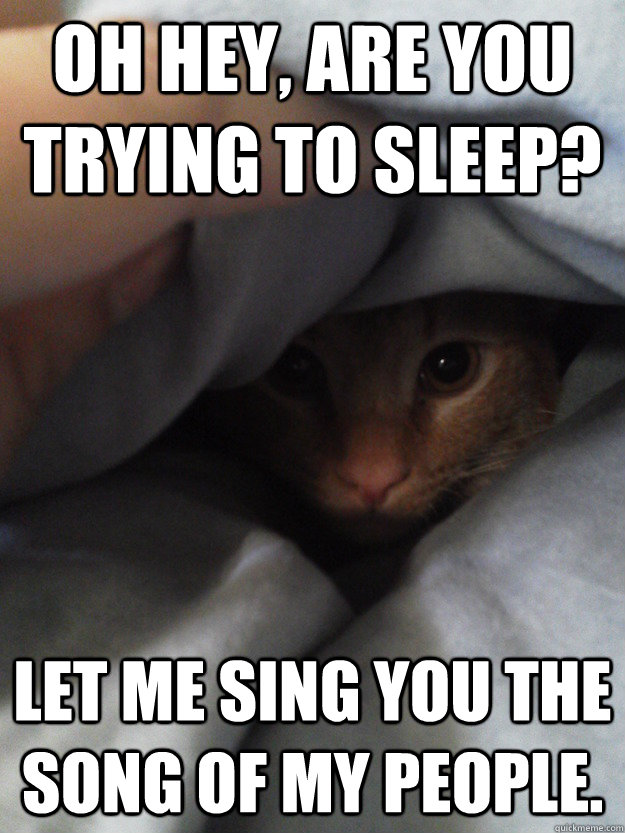I'm up at an unpleasantly early hour today. It wasn't my idea. Once again Cleo's howling woke me up. During the past year or so the cat has developed an annoying odd habit of, as they say, singing the song of her people at odd times and for no apparent reason. There are times when if the cat wasn't almost 15 years old and spayed you'd swear she was in heat. I've discussed the howling with her veterinarian several times and there is no detectable physical reason for it. Other than being fat and diabetic, she's a healthy cat.
So is she slipping into the feline version of senile dementia? Do cats get Alzheimer's? Dr. Google, D.V.M., reports that yes, cats can indeed exhibit the same brain abnormalities associated with Alzheimer's in other mammals. They can also exhibit symptoms of something called "feline cognitive dysfunction," which appears to be another way of saying senility. Senility as a label seems to have slipped out of fashion -- no doubt it's evolved into a term that is now seen as "ageist" in the same way mentally retarded slid from being a common descriptor into an insult -- but senility would seem to cover some of Cleo's more annoying recent behavior.
One of the signs of feline cognitive dysfunction, incidentally, is the cat "sleeps more." How could it be possible for any cat to "sleep more"?! As far as I can tell after many years of living with cats, a typical cat's day consists of waking up just long enough to switch napping locations, although they do toss in an occasional brief break to eat or use the litter box. How is it possible for any beast to sleep more than the 23+ hours a day a typical cat already spends dozing?
Of course, the cat always has been neurotic and prone to anti-social behavior. I wound up with her when she was still a pretty young kitten. The older daughter had been given the kitten but realized she couldn't keep her after Cleo decided a Packer hat belonging to a friend would make a great litter box. The Packer hat was actually the last straw; prior to that, Cleo had left her mark on several other items belonging to the friend. So I agreed to keep Cleo for a week or two while Zu looked for another home for her. That was back in 2000. It appears I'm stuck with the cat.
One of the other symptoms of cognitive dysfunction associated with aging in cats is that problems with separation anxiety increase. Despite their reputation for aloofness, cats apparently are actually rather fond of the hand that feeds them and don't handle being separated from familiar people or places very well. Maybe we've just been traveling a little too much -- it's taking Cleo longer to relax and adapt to changes than it used to. If that's the case, I'm thinking the S.O. and I may need to learn to sleep with ear plugs because we're not going to be staying in one place for more than a few months at a time in the foreseeable future.

I have to say that my Mencken, a similar age, also seems to be losing his marbles. He is very needy and clingy and doesn't move much. I suspect the stroke that took out part of his brain didn't help in that regard, since he wasn't a very smart cat to begin with (15 years, and he *still* hasn't figured out that whole push-and-retract thing for getting his claws unsnagged!).
ReplyDeleteLuckily Mencken was a sweet kitteh to begin with, so I just give him the attention he craves and he cuddles up to me and purrs. He won't be with me too much longer, so why not, eh?
Cats are probably smart enough to fake symptoms so you have to do everything for them.
ReplyDeleteMy cats are getting up there in years also, one is becoming pretty clingy. Can they lose their minds? I'm pretty sure they do just as we do, and I'm pretty sure they they won't miss those fucking minds anymore than we will.
ReplyDelete"feline cognitive dysfunction,"
ReplyDeleteIsn't that the normal cat condition??
We recently lost our cat of eighteen years a year ago January. It was a trauma to put her down and the house felt empty and foreign with her gone.
ReplyDeleteShe was a Ragdoll which has a Siamese blood = she was very vocal, especially in her later years. She hated travel and howled all the way from Maine to Alaska and again all the way back.
We miss her but recently got two Maine Coon Cats; not as a replacement but because a house without cats, when you are use to having one around, is not a home. the Ol'Buzzard
I'm with Kulkuri on this one
ReplyDelete